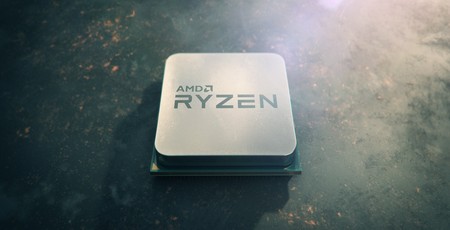
Overclocking
We've already covered parts of our overclocking exploits in relation to Ryzen Master's new features, but for the all-core overclocks, we managed 4.2GHz with the Ryzen 5 2600X and 4.25GHz with the Ryzen 7 2700X, both with vcores of 1.425V. This is roughly in line with AMD's claims and a good 200-300MHz higher than what we usually manage with first-generation Ryzen CPUs. It's generally worth it too, especially with the Ryzen 5 2600X, as it's maximum boost frequency is also 4.2GHz and the all-core boost usually sat around 4.05GHz at stock speed, so our 4.2GHz all-core overclock yielded some tidy performance increases.
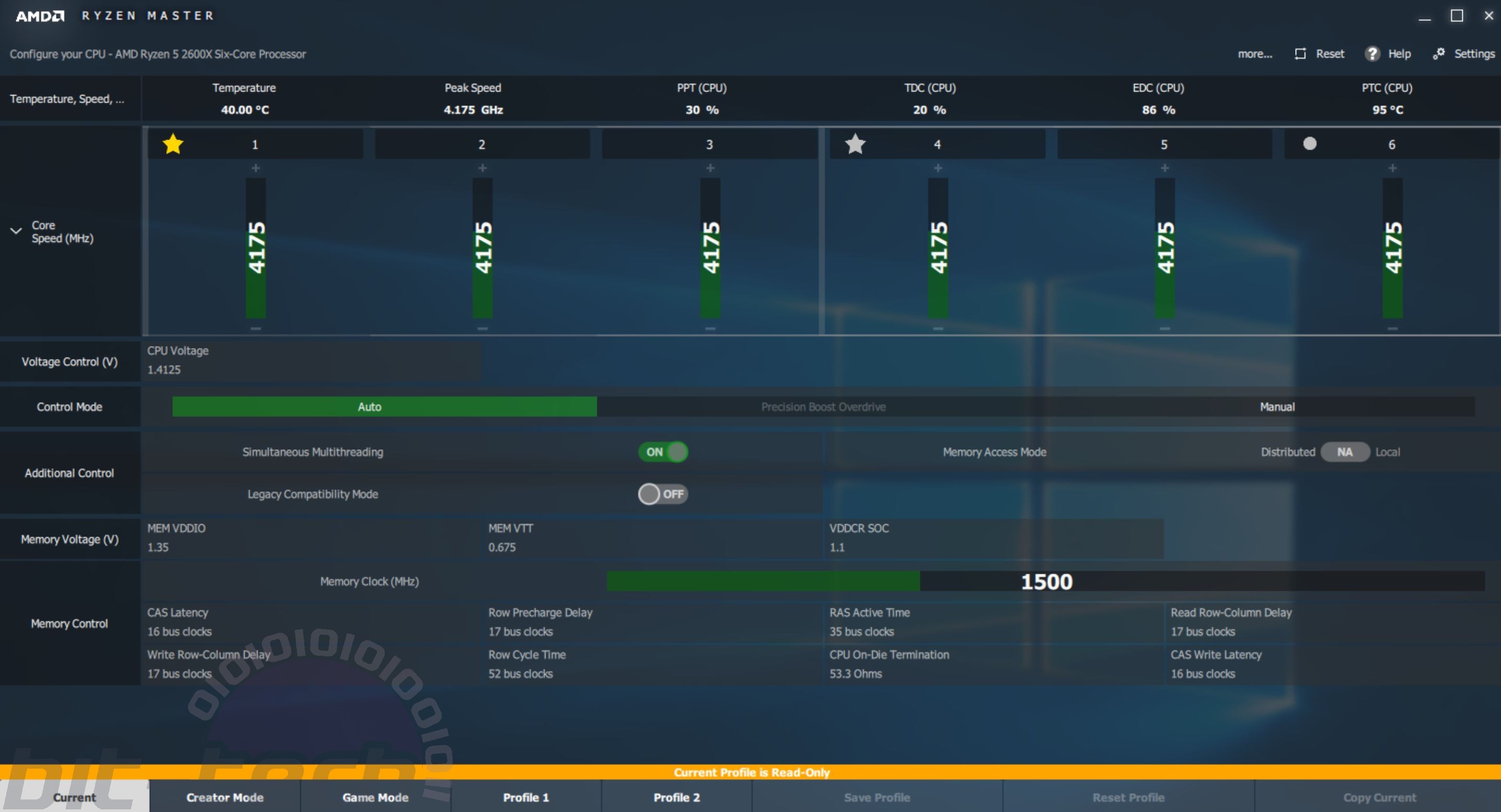
However, with the Ryzen 7 2700X, as it can boost to 50MHz higher than the all-core frequency we achieved, we're looking at a similar situation to Threadripper in that the stock speed boosting can outstrip its all-core overclocking, resulting in slower results in some lightly-threaded benchmarks when the overclock is applied (thus capping the peak boost speed).
Performance Analysis
Thankfully, all the hype has generally not been without foundation, as the higher frequencies and better boosting have increased performance significantly across the board. In HandBrake, the new flagship was a huge amount quicker than the Ryzen 7 1800X, and the Ryzen 7 2700X beat the Core i7-8700K here too and by a significant margin at that. PCMark 10's Photo Editing test showed the new CPUs being equally rapid with the higher frequencies seeing even the Ryzen 5 2600X bettering both the Core i7-8700K and Ryzen 7 1800X. The boost to single-core and multi-core performance were fairly evident across the board, with CPU-Z seeing the single-threaded test score rise from 445 with the Ryzen 7 1800X to 487 with the Ryzen 7 2700X. Similarly, the multi-threaded score rose from 4,551 to 4,989.
The Ryzen 7 2700X made some significant gains in Cinebench too, and while you might argue that an overclocked Core i7-8700K was nearly a match for the Ryzen 7 1800X in the multi-threaded test with overclocked scores of 1,630 and 1,759 respectively, the Ryzen 7 2700X smashes that argument with a score of 1,907 when overclocked and 1,810 even at stock speed. Intel still has that single-threaded advantage, though, as is fairly clear in Cinebench's single-threaded test, but AMD has made significant headway here compared to the older Ryzen CPUs.
It's interesting seeing results from lightly-threaded programs such as Hamster Zip Archiver, with the stock speed scores of the older CPUs differing significantly from the overclocked results - almost certainly due to the old boosting algorithms. Fast forward to Ryzen 2nd Gen CPUs, and there's very little difference between stock and overclocked, showing that the boosting really is holding those higher frequencies.

The all-important game benchmarks paint a similar story with increases in every single test compared to predecessors. Intel still has an advantage here - not in every game, mind you, as Fallout 4 clearly shows that where the game leans more on the graphics card, you won't see much difference. In games such as Deus Ex, though, Intel holds a lead, but it's been reduced significantly by 2nd Gen Ryzen.
We should mention memory performance here, too, as this is really important. AMD actually provided a 3,400MHz kit with our press sample, and our test X470 board had no problems hitting this. But, for continuity across our benchmarks and the fact we got stung last time with Ryzen's poor memory support, we've used 3,000MHz with all our tests. However, we wanted to show that memory speed could make a big impact and ran a select group of tests we knew responded well to faster memory. For example, the minimum frame rate in Deus Ex rose from 64fps with 2,666MHz memory to 71fps with 3,400MHz. That's just a couple of frames behind the Intel CPUs, cutting the gap that 2nd Gen Ryzen had already narrowed even further.
Power consumption reveals that this is somewhat of a brute force approach, with the power consumption especially of the Ryzen 7 2700X noticeably higher than the Ryzen 7 1800X under load at stock speed and when overclocked. However, at stock speed, the fact the Ryzen 7 2700X only draws an additional 39W compared to the Core i7-8700K but provides an additional two cores and four threads isn't likely to be something that most enthusiasts will worry about.
Conclusion
AMD has done exactly what it needed to with both the Ryzen 7 2700X and Ryzen 5 2600X, closing the gaps between it and Intel in those lightly-threaded tests (including games) while also extending its lead in multi-threaded applications, where it's now in a different league to the Core i7-8700K, even with the latter at 5GHz. The final point is important, as it kills the argument that Intel's Hyper-Threaded hexa-core is basically as fast in multi-threaded tests making it the better all-rounder. This is now not the case.
While at 3,000MHz memory speed, for a purely gaming system, we'd probably struggle to recommend anything other than Intel. However, switching to a 3,400MHz kit, which doesn't cost that much more, saw a big improvement in performance in Deus Ex, which was the title AMD seemed to struggle in. AMD has certainly closed the gap in terms of CPU frequencies, but the better RAM support we're seeing is reaping benefits with Infinity Fabric too. We're now talking just a couple of frames behind Intel, not 10 or more, which is great news.
Clearly, opting for memory faster than this quickly becomes prohibitively expensive, and in some titles you won't even notice the difference. Whether this is due to lack of optimisation or Intel's higher frequencies is beside the point - Intel is still faster. Even with our relatively high-end system sporting a GTX 1080 and running our benchmarks at 1080p, though, the difference was only around 11 percent at worst with the slower memory and in one title. With a less powerful GPU or at higher resolutions or with faster memory, the gap would be narrower still.
There is one thing we haven't mentioned yet, though, which is price. AMD is being extremely aggressive here, and not only are its first generation Ryzen CPUs available for bargaintastic prices, but the new mainstream flasghip Ryzen 7 2700X is available for less than £300, which is £200 less than the Ryzen 7 1800X cost at launch, yet it's considerably faster. That's good value in anyone's books, and Intel, of course, has had to respond. The Core i7-8700K has fallen from a launch price of £360 to just over £300 in less than six months, and we're now seeing it pop up occasionally for less than this too. Even after being discounted to the same price as AMD's new flagship, though, it lacks the multi-threaded grunt to compete, so AMD is still forcing us to make a choice between the two.
An eight-core Intel mainstream CPU is clearly one option the blue team has, but that's just one small battle in a very large war, and AMD has some rather potent new weapons for 2018 to keep that competition in full flow with the Ryzen 7 2700X being the best of the bunch so far. It's not the revolutionary leap we saw last year, but AMD has shown its latest hand, and it's a good one, although there's still room for improvement in one or two areas.
Ryzen 7 2700X
You'll see significantly better multi-threaded performance from the Ryzen 7 2700X even at stock speed, and for less cash, than the Core i7-8700K. Backed up with 3400MHz or higher memory, you'll be losing little in terms of performance in games too. It's simply a great CPU for the money.

Ryzen 5 2600X
The Ryzen 5 2600X isn't quite as exciting for the simple reason that its lower frequencies limit the impact of Precision Boost 2 and XFR 2, but it's still a far superior CPU both to the Ryzen 5 1600X, which was close to 10 percent slower in some of our game tests, and to the Core i5-8600K in multi-threaded tasks too. Similarly, with fast memory, the gap between it and the Core i5-8600K is far narrower than it was with the Ryzen 5 1600X, so for many users it will be a compelling option.


MSI MPG Velox 100R Chassis Review
October 14 2021 | 15:04

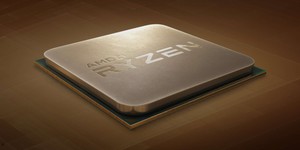
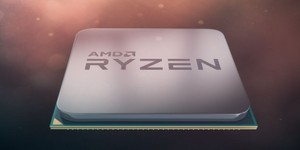
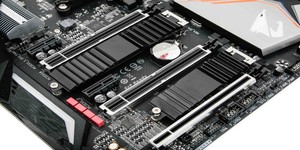




Want to comment? Please log in.